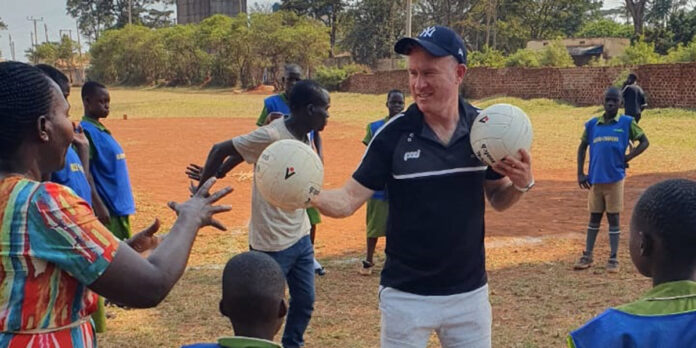While Michael Cusacks were busy winning the Junior A Championship last week, 9,000 kilometres away, one of the club’s stalwarts was making massive strides for Gaelic games in Africa.
New Quay man, John Conroy, has been working with some of the poorest communities in Uganda for more than 10 years.
In recent times, John’s work has seen him introduce Gaelic Football into a school in Jinja in eastern Uganda, focussing to begin with on a class of 30 deaf children.
On Monday, October 28, John joined the Irish Ambassador to Uganda, Kevin Colgan, in Kampala where the words for ‘hurling’ and ‘Gaelic Football’ were officially made part of Ugandan sign language.
John first visited Uganda in 2009 as a volunteer at the Rays of Hope Hospice founded Frank and Patricia Hassett from Ennis. In recent times however, he has focussed his attention on the Walukuba West Primary School where earlier this year he founded Nile Óg Cusacks GAA Club.
“Football has really taken off. It started first with the 30 blind children but now it is spreading off into the rest of the school where there are 1,200 kids,” said John.
“We are sticking with football at the moment because we don’t have hurleys and helmets, so it is a lot more practical to stay with football. But that said, we have plans down the line to introduce hurling.
“There are two Uganda based coaches that I am coaching and I am coaching the teachers whenever I come over. The teachers then have picked out lead pupils in each of the classrooms, there could be 100 to 120 kids in each classroom. The lead kids are really important, they pick up the skills and pass them onto the other kids in each class.”
John and nine other Clare volunteers visited Uganda this summer and invested more than €58,000 raised in Clare to found the club, to renovate the school and help fund the hospice.
“At the moment, nobody is funding the project, it is all being funded by the Clare people who donated to our fundraising through the year,” said John.
“We are in contact with the GAA, with a view to becoming a registered club, and once we become a registered club we can hopefully look for some formal funding to help sustain the club going forward.
“The potential good in this is massive. There is no PE curriculum in school in Uganda. So when we approach the teachers, they love it. We are well organised and structured, so when it comes to training, we know what we are doing. I have been approached by three or four other communities to get involved, but it is not possible at the moment. If we can get official recognition and funding, that will allow us train more coaches. If we can train more coaches, then the numbers will spread rapidly. There are 50 million people in Uganda, half of them are under 16, so 25 million young people who are crying out for physical activity.
“Most of the kids don’t have shoes, never mind football boots. The people here just don’t have the money for this sort of gear so to get it was amazing. We also got a lot of training tops and Cúl Camp gear, and to get all of that was amazing.
“There is no real organised sports or physical activity within the school system in Uganda. If the GAA managed to come in and support us, there is massive potential for expansion here.”
While John visits Uganda as often as possible, he coaches the children remotely by sending plans for coaching sessions and videos back and forth over WhatsApp.
“They pick up the skill very quickly, even though they might be 13 or 14 years old when they start. They all walk to school each morning, some walk one or two hours to get to school. They live in small farm holdings, so they are digging and bringing water all the time. There are no cars here, so they are moving all the time,” he said.
“They have an innate fitness and strength in them. They are well able for Gaelic football.
“We have a WhatsApp group with the two coaches, a teacher and the headmaster. We train three times a week for an hour and a half each day. I put up a training plan each day before training, the coaches take it on, and they send back videos from the drills and I send them tips of different things that they can do.”
Taking part in Gaelic football has already made a massive impact on the children in the deaf classroom at Walukuba West Primary School.
“It is very tough to be a special needs child in Uganda. There is often no place for them in society. It can sometimes also be seen as shameful to have a child with special needs,” said John.
“Sometimes the family might hide the child so as not to be seen as having a child with special needs. Often times the husband would leave his partner. They believe in things like spirits, that the child might be cursed, so they might resort to witchcraft to take the evil out of the child.
“To give these kids a platform to express themselves and be seen as normal is huge for the kids. Even the parents are surprised to see what the kids can do. They are amazed by their sporting prowess. They can see a lot more value in them because they can take part in this sport.”
Last week was a big one for the children of Walukuba school, and potentially for the growth of Gaelic games in Africa.
“We brought the kids to the Irish embassy where Ambassador Kevin Colgan launched two new words in Ugandan sign language. The words Gaelic football and hurling now exist in Ugandan sign language, the first two Irish words to ever be included in it,” said John.
“We brough the kids to a coffee shop after where deaf kids were working. The whole idea was to show them that there are opportunities for people with disabilities.
Along with growing the football club, John will be fundraising to build a new dormitory for the school in 2025, which will help it to accommodate 100 more students.
Andrew Hamilton is a journalist, investigative reporter and podcaster who has been working in the media in Ireland for the past 20 years. His areas of special interest include the environment, mental health and politics.


